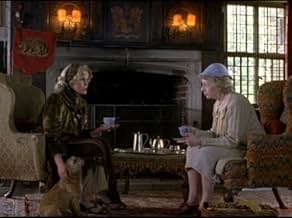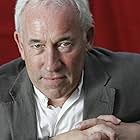The Body in the Library
- Episode aired Apr 17, 2005
- 1h 34m
IMDb RATING
7.1/10
2.7K
YOUR RATING
Dolly Bantry calls upon her old friend Miss Marple when the strangled corpse of an unknown blonde girl is found in the library of her home, Gossington Hall.Dolly Bantry calls upon her old friend Miss Marple when the strangled corpse of an unknown blonde girl is found in the library of her home, Gossington Hall.Dolly Bantry calls upon her old friend Miss Marple when the strangled corpse of an unknown blonde girl is found in the library of her home, Gossington Hall.
- Director
- Writers
- Stars
- Nominated for 1 Primetime Emmy
- 3 nominations total
Bruce Mackinnon
- Scamper
- (as Bruce MacKinnon)
- Director
- Writers
- All cast & crew
- Production, box office & more at IMDbPro
Featured reviews
This one isn't terrible, but falls short the book, which is the best Marple book after Sleeping Murder and A Murder is Announced. Geraldine McEwan is good as Jane Marple, but I much preferred Joan Hickson, and I felt the actress gave her weakest performance of the character in this one. Here, her voice got a bit annoying. The casting isn't bad, but Joanna Lumley does overact. Simon Callow and Ian Richardson are fine though. The camera work is very nice, as are the costumes, though I wasn't a huge fan of the music. Nor with the weak script or direction or that the whole adaptation felt rushed. The adaptation stays fairly faithful to the book, but I hated it when they changed the murderers, and made up the story of a lesbian relationship...WHAT? Still, it is inferior to the much better 4.50 From Paddington. For a more faithful adaptation, see the Joan Hickson version instead.6.5/10 Bethany Cox
This entire series is Christie for a millennial audience: Brash, up-tempo, get-to-the-point. (And sex is just sex; isn't everyone doing it?) Miss Marple herself comes across as a frowning busybody.
I can see how a new generation may have wanted to give these stories an "update." A bit of brisk pace and wicked comedy here, a bit of extra passion and feminism there. Sadly, the result is a dull, predictable case study in Ugly is The New Beautiful. All the quiet, caring, understated Englishness that was oozing from the 20th-century adaptations has been wiped out. Today's young audience has no use for it. One gets a strong impression that more than anything else, these stories were just a vehicle for a new breed of directors to get noticed and then to follow the money to big jobs like CSI Miami.
In truth, I can no more view, let alone enjoy, these post-2000 films than a lifelong carnivore can relish a vegan, non-dairy, non-allergenic dish.
I can see how a new generation may have wanted to give these stories an "update." A bit of brisk pace and wicked comedy here, a bit of extra passion and feminism there. Sadly, the result is a dull, predictable case study in Ugly is The New Beautiful. All the quiet, caring, understated Englishness that was oozing from the 20th-century adaptations has been wiped out. Today's young audience has no use for it. One gets a strong impression that more than anything else, these stories were just a vehicle for a new breed of directors to get noticed and then to follow the money to big jobs like CSI Miami.
In truth, I can no more view, let alone enjoy, these post-2000 films than a lifelong carnivore can relish a vegan, non-dairy, non-allergenic dish.
We all know the story, so I think it was bold of the writer to make a few edits and change things a bit, or there'd have been no need to make the series. Setting it in the 50's was a daring move, but I feel it paid off. She was a very different Jane Marple to Joan Hickson, scatty, clever and massively less shockable, she was a mature character that had a love interest and a modern outlook on life. I loved the cheeky glint in the eye she had. Fair to say I find almost all of Joan's productions superior I think this one stands up fairly well, it moves along at a nice pace. There are some great performances, Joanna Lumley, Simon Callow and Ben Miller are a great supporting cast. The music is splendid, Zadok the Priest, sets the tone. The scene where Geraldine says 'because when you're in love you think you're invincible, it blinds you,' is particularly moving. Who knows if the twist at the end was the right or wrong decision. I'm a huge Christie fan, and it didn't bother me, I was glad to see something different attempted.
Another Christie's classic with an unexpected ending,adding a risqué Relationship which was not,of course,in the detective story.(there's also a nod at " a place in the sun" and at Mister Montgomery Clift,a coincidence?) True to form,Miss Marple does not question the suspects,she does not look for fingerprints with a magnifying glass;she talks of this and that with all of them,or she closely listens to what they say;and above all,she watches (the nails are a good example) This episode takes us to a luxury hotel in Brighton ;a too brief appearance by aging James Fox ;and ,one more time,a brilliant example of Mrs Christie's algebra.I particularly like the moment when she reveals the truth to the two cops,cool ,calm and collected .This mischievous spinster was woman's lib before its time .
With the exception of the BBC series with Joan Hickson, film-makers struggle with Miss Marple. The point of Miss Marple, Agatha Christie's brilliant concept, was to make her a member of the most disregarded and voiceless species of human being - the elderly spinster. Persistently underestimated, she proves herself wiser than more worldly characters - the police of course, but also her annoying nephew Raymond West, various carers and others. She was genteel, polite, cultivated, gossipy, nosy, unprepossessing, feminine, politically incorrect, conservative and traditional. The only thing that marked her out was her understanding of human evil.
This series disregards all this. The essential 'Miss' is dropped in favour of the modern-sounding 'Marple'. She is quirky, not ordinary. It is hinted that she has had an affair, as if sexual experience was necessary to make someone a whole person. She is sophisticated, not provincial. Christie's Miss Marple would hardly have taken revelations of lesbianism in her stride; she was never unshockable and never approved of metropolitan ways. Presumably these character changes are to make her 'relevant' for modern audiences. Of course, the effect is to negate Christie's feat of imagination, by turning a remarkably unremarkable character into an unremarkably remarkable one. It undoes Christie's aim of reminding us that even very ordinary people can do wonderful things, and shows immense disrespect for a generation of people and a vanished way of life.
Fuss has been made about changing the ending of this and other novels. This is not the real crime of the makers - admittedly it takes hubris to tinker with Christie's logic but there is no reason not to challenge or tease the audience. The real crime was to kill Miss Marple and replace her with a Generation X view of what a little old lady should be like. Geraldine McEwan's Marple would have celebrated the Relief of Mafeking by drinking 10 Bacardi Breezers and getting her tits out in Trafalgar Square. The best production values in the world would not turn this travesty into anything worth watching
This series disregards all this. The essential 'Miss' is dropped in favour of the modern-sounding 'Marple'. She is quirky, not ordinary. It is hinted that she has had an affair, as if sexual experience was necessary to make someone a whole person. She is sophisticated, not provincial. Christie's Miss Marple would hardly have taken revelations of lesbianism in her stride; she was never unshockable and never approved of metropolitan ways. Presumably these character changes are to make her 'relevant' for modern audiences. Of course, the effect is to negate Christie's feat of imagination, by turning a remarkably unremarkable character into an unremarkably remarkable one. It undoes Christie's aim of reminding us that even very ordinary people can do wonderful things, and shows immense disrespect for a generation of people and a vanished way of life.
Fuss has been made about changing the ending of this and other novels. This is not the real crime of the makers - admittedly it takes hubris to tinker with Christie's logic but there is no reason not to challenge or tease the audience. The real crime was to kill Miss Marple and replace her with a Generation X view of what a little old lady should be like. Geraldine McEwan's Marple would have celebrated the Relief of Mafeking by drinking 10 Bacardi Breezers and getting her tits out in Trafalgar Square. The best production values in the world would not turn this travesty into anything worth watching
Storyline
Did you know
- TriviaAmong others, Eileen Atkins and Annette Crosbie were considered for the part of Miss Marple's friend Dolly Bantry. The part was eventually given to Joanna Lumley, who calls herself a "die-hard Christie fan".
- GoofsIn the scene showing the Pier at "Danemouth", a modern double decker bus is visible driving past.
- Quotes
Basil Blake: [introducing his wife to Colonel Melchett] Dinah Lee, minor actress, major slut!
- ConnectionsFollowed by Marple: The Murder at the Vicarage (2004)
- SoundtracksZadok the Priest, Hwv 258
(uncredited)
By George Frideric Handel
[first shot of the body in the library]
Details
- Release date
- Countries of origin
- Official site
- Language
- Also known as
- Agatha Christie's Marple
- Filming locations
- Production companies
- See more company credits at IMDbPro
Contribute to this page
Suggest an edit or add missing content























